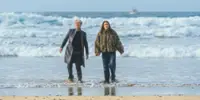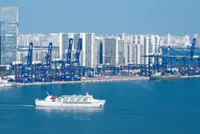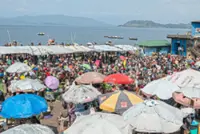FOR years, the bodies piled up.
Some were shot by vigilantes on motorbikes. Others were executed with bullets to the head.
Each time, police dismissed the victims as “drug suspects” who had resisted arrest – claims that rarely held up to scrutiny.
And yet, the slaughter continued with impunity under the watch of Rodrigo Duterte, the man elected president of the Philippines on a promise to eradicate drugs.
But on March 11, nearly three years after Duterte left office, the long pursuit of justice took a major step forward.
Acting on a warrant issued by the International Criminal Court (ICC), Philippine authorities arrested Duterte at Manila’s main airport as he returned from Hong Kong. That night, he was flown to The Hague, where the court is based, according to two sources familiar with the matter.
The ICC has charged Duterte, 79, with crimes against humanity for his role in the country’s brutal anti-drug campaign, both as president and as mayor of Davao City.
His case will be a critical test for the ICC, which has also sought the arrests of Israeli Prime Minister Benjamin Netanyahu and Myanmar’s junta leader Min Aung Hlaing on similar charges.
However, as seen with the court’s warrant for Russian President Vladimir Putin, such orders often remain unenforced.
A crack in Duterte’s impunity
Duterte’s camp insists his detention is illegal, arguing that the ICC has no jurisdiction since he withdrew the Philippines from the court during his presidency.
But the warrant states that the killings under investigation occurred while the country was still an ICC member.
Furthermore, the Philippines remains part of Interpol, which assists the ICC with arrests. A representative from Interpol was present when Duterte was taken into custody.
His arrest shattered the culture of impunity he built around his so-called death squads.
Even after his single six-year term ended, he appeared untouchable.
His successor, Ferdinand Marcos Jr, rose to power through an alliance with Duterte’s daughter, Sara, who became vice-president.
Early in his administration, Marcos signalled he would not cooperate with the ICC.
However, tensions between Marcos and Sara Duterte escalated.
By late 2023, Marcos’ government had quietly allowed ICC investigators into the country, setting the stage for Duterte’s downfall.
Joy and frustration
For the families of drug war victims, Duterte’s arrest was long overdue.
“It took so long, so many lives,” said Grace Garganta, 32, whose father and brother were killed by masked gunmen just hours apart in July 2016.
“I almost lost hope, but this has renewed my belief that even small victims like us can stand a chance against Duterte and his powerful men.”
In Manila, a cafe run by mothers, wives and daughters of drug war victims offered customers a 50% discount on drinks. In Quezon City, a special Mass was held, with candles lit beside photographs of the slain.
“I’m ecstatic,” said Leila de Lima, a former senator jailed for six years for criticising Duterte’s drug war. “This is something I had been hoping and praying for. The time for reckoning is finally here.”
Yet justice still feels distant for some
Mary Ann Domingo’s partner and son were killed when police stormed her tiny apartment at the height of Duterte’s crackdown.
In a rare conviction last year, four police officers were found guilty of homicide for their deaths – but they remain free.
“I don’t feel any sense of justice,” Domingo said. “Duterte has no remorse.”
Duterte’s last stand
For decades, Duterte ruled with impunity.
As mayor of Davao, he waged a ruthless anti-drug campaign, earning him a reputation that propelled him to the presidency in 2016.
But experts argued the country did not have an outsized drug problem – only a leader who weaponised fear.
Even as they mourned their loved ones, few Filipinos ever imagined Duterte would be held accountable.
On March 7, he made an unexpected trip to Hong Kong, sparking speculation he was attempting to outrun the ICC. But he returned four days later, defiantly addressing reporters as he stepped off the plane.
“You would have to kill me first if you are going to ally with white foreigners,” Duterte declared in a video posted by a Philippine broadcaster.
Moments later, he was served the ICC warrant.
The warrant states that three ICC judges believe Duterte is responsible for the drug war killings that took place under his rule, describing them as “both widespread and systematic”.
Duterte’s spokesman, Harry Roque, said lawyers are working to secure his release. Meanwhile, his daughter Sara slammed the arrest, calling it “oppression and persecution”.
The road to justice
Last year, the Philippine House of Representatives launched an inquiry into Duterte’s drug war.
While he refused to testify in the House, he appeared before the Senate, where he still enjoys significant support, in October.
“For all of its successes and shortcomings, I, and I alone, take full legal responsibility,” he said of the anti-drug campaign.
“For all the police did pursuant to my orders, I will take responsibility. I should be the one jailed, not the policemen who obeyed my orders.”
With recent developments, that possibility is now a reality. — ©2025 The New York Times Company
This article originally appeared in The New York Times





